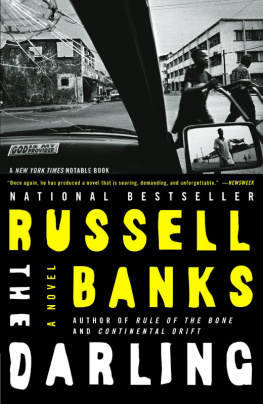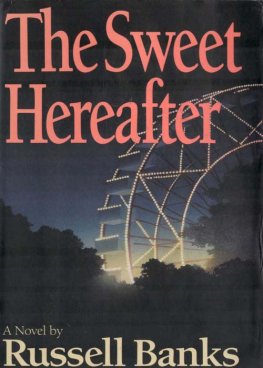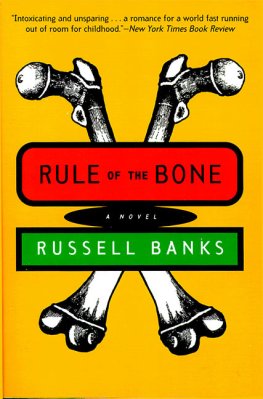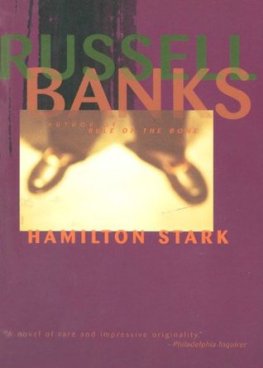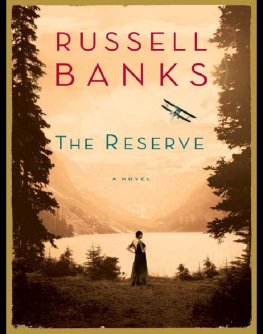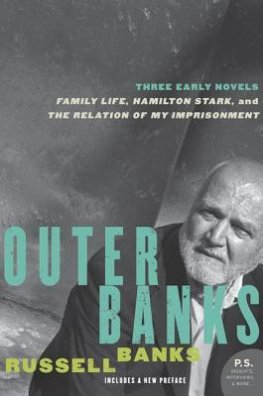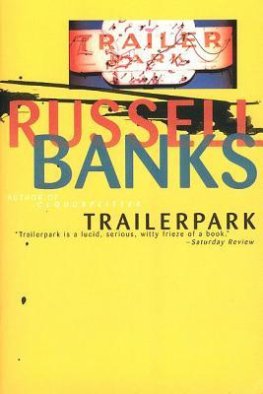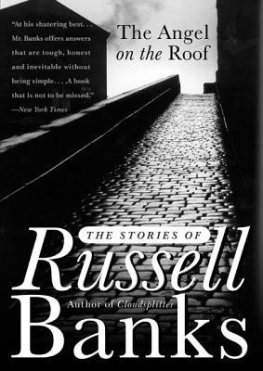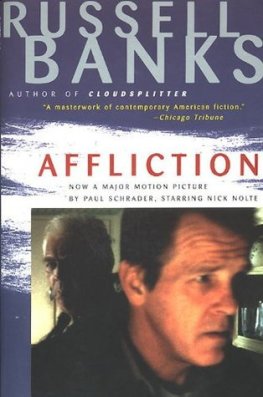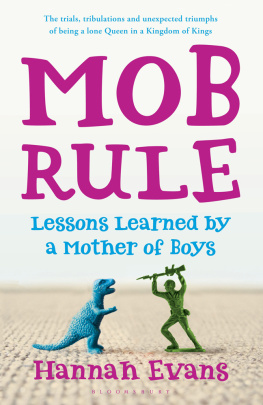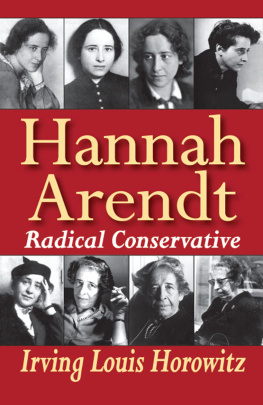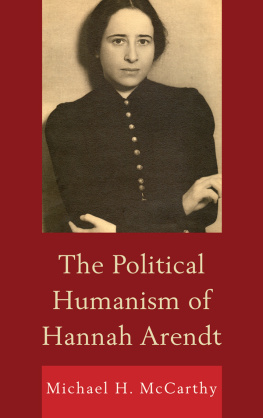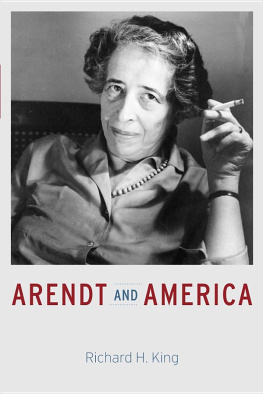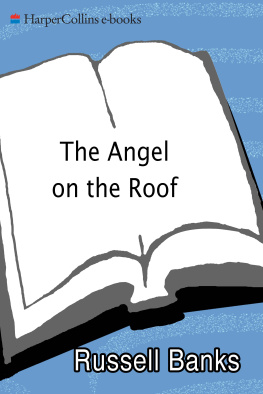The Darling

RUSSELL BANKS

To C. T., the beloved
and in memory of Anne Trachtenberg Hughes (d. 2004 )
and Charles Pratt Twichell (d. 2004 )
CONTENTS

A FTER MANY YEARS of believing that I never dream of anything, I dreamed of Africa. It happened on a late-August night here at the farm in Keene Valley, about as far from Africa as I have been able to situate myself. I couldnt recall the dreams story, although I knew that it was in Africa, the country of Liberia, and my home in Monrovia, and that somehow the chimps had played a role, for there were round, brown, masklike faces still afloat in my mind when I awoke, safe in my bed in this old house in the middle of the Adirondack Mountains, and found myself overflowing with the knowledge that I would soon return there.
It wasnt a conscious decision to return. More a presentiment is all it was, a foreboding perhaps, advancing from the blackest part of my mind at the same rate as the images of Liberia drifted there and broke and dissolved in those dark waters where Ive stored most of my memories of Africa. Memories of Africa and of the terrible years before. When you have kept as many secrets as I have for as long as I have, you end up keeping them from yourself as well. So, yes, into my cache of forgotten memories of Liberia and the years that led me therethats where the dream went. As if it were someone elses secret and were meant to be kept from me, especially.
And in its place was this knowledge that I would soon be going backforeknowledge, really, because I didnt make the decision until later that day, when Anthea and I had finished killing the chickens and were wrapping them in paper and plastic bags for delivery and pickup.
It was at the end of summer, the beginning of an early autumn, and though barely a year ago, it feels like a decade, so much was altered in that year. The decade here: now, that seems like a few days and nights is all, because nothing except the same thing has happened here day after day, season after season, year after year. No new or old returning lovers, no marriages or divorces, no births or deaths, at least among the humans. Just the farm and the world that nourishes and sustains it. Timeless, it has seemed.
The farm is a commercial operation, inasmuch as I sell most of what I grow, but in truth its more like an old-fashioned family farm, and to run it Ive had to give over my personal clock. Ive had to abandon all my urban ways of measuring time and replace them with the farms clock, which is marked off by the needs and demands of livestock and the crops, by the requirements of soil and the surge and flux of weather. Its no wonder that farmers in the old days were obsessed with the motions of the planets and the waxing and waning of the moon, as if their farms were the bodies of women. I sometimes think its because I am a womanor maybe its merely because I lived all those years in Liberia, adapted to African timethat I was able to adapt so easily to the pace and patterns and rhythmic repetitions of natures clock and calendar.
It was as usual , then, on that August morning, with the darkness just beginning to pull back from the broad river valley to the forests and the mountains looming behind the house, that I woke at five-thirty and came downstairs wearing my flannel nightgown and slippers against the pre-dawn chill, with the dogs clattering behind me, checked the temperature by the moon-faced thermometer outside the kitchen window (still no frost, which was good, because wed neglected to cover the tomatoes), and put the dogs out.
I made coffee for Anthea, who comes in at six and says she cant do a thing until after her second cup, and the other girls, who come in at seven. I lingered for a few moments in the kitchen while the coffee brewed, enjoying the dark smell of it. I never drink coffee, having been raised on tea, a habit I took from my father as soon as hed let me, but I do love the smell of it when its brewing and buy organic Colombian beans from a mail-order catalogue and grind them freshly for each pot, just for the aroma.
For a few moments, as I always do, I stood by the window and watched the dogs. They are Border collies, father and daughter, Baylor and Winnie, and when they have done their business, the first thing they do every morning is patrol the property, reclaiming their territory and making sure that during the night nothing untoward has happened. Usually I watch them work and think of them as working for me. But this morning they looked weirdly different to me, as if during the night one of us, they or I, had changed allegiances. They looked like ghost dogs, moving swiftly across the side yard in the gray pre-dawn light, disappearing into shadows cast by the house and oak trees, darting low to the ground into the garage, then reappearing and moving on. Today they worked for no one but themselves; thats how I saw them. Their gait was halfway between a trot and a runfast, effortless, smooth, and silent, their ears cocked forward, plumed tails straight backand they seemed more like small wolves than carefully trained and utterly domesticated herding animals.
For a moment they scared me. I saw the primeval wildness in them, their radical independence and selfishness, the ferocity of their strictly canine needs. Perhaps it was the thin, silvery half-light and that I viewed them mostly in silhouette as they zigged and zagged across the yard, and when theyd checked the garage, an open shed, actually, where I park the pickup truck and my Honda, they moved on to the barn and from there to the henhouse, where the rooster crowed, and then loped all the way to the pond in the front field, where they woke the ducks and geese, never stopping, running in tandem, a pair of single-minded predators sifting their territory at peak efficiency.
In their mix of wildness and control, they were beautiful. In their silence and indistinct, shape-changing fluidity, they frightened me. Five minutes ago they had been under my control, curled in my bed, crowding me to one side of it like a pair of human children. And now they were wild dogs, the kind of beasts the ancient people glimpsed slipping through the brush at dawn between the campsite and the forest.
They had not changed overnight, of course. But maybe, because of my dream of Africa and the chimps, I had, and the dogs were sensing it, as if I had somehow betrayed them. Then when Anthea drove in along the lane from the road, headlights bobbing like heavy fruit on a tree as her beat-up Jimmie pickup passed along the ruts, the dogs ran to her truck as they do every day, and when she stepped out they greeted her with their usual yipping commotion and followed her to the side porch. But when they entered the kitchen behind her, they slipped quickly into the living room, then furtively circled through the dining room to the kitchen again and made for the door and scratched at it to be let back out.
Anthea yanked off her cap and ruffled her auburn curls with one hand and watched the dogs. She screwed up her face and said, Whats with them doggies?
I dont know, I said. Maybe something spooked them.
She opened the door, and the dogs bolted across the yard and out of sight. Must be you thats spooking them, Hannah. She laughed and filled her mug with coffee, sighed heavily, and sat down at the table.
Maybe its the moon. I had strange dreams all night. You?
Nope. Slept like a hibernated bear. Full moons not for another three days anyhow. Anthea is impish and winking, a large woman, strong; if she were a man youd call her burly. She has a broad, flat face the shape and color of a raspberry, a peasant face, some might say, and probably a lot of the summer people have. But if you look, you can tell at once that shes good humored and hard working and possesses an abundance of mother wit. Everything about her expresses intelligent energy.
Next page
